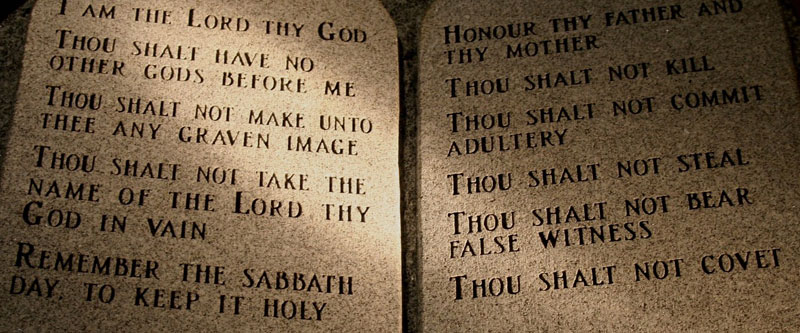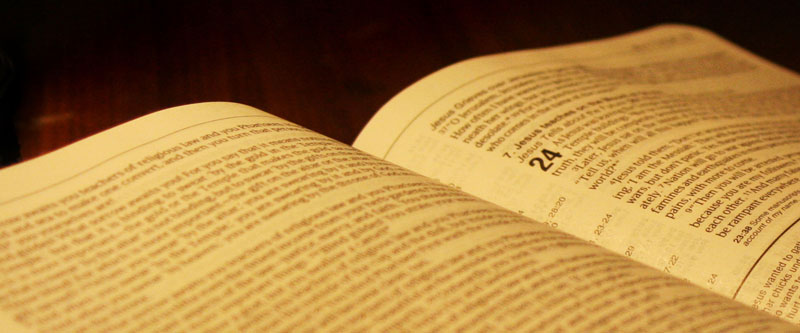“The law sends us to the Gospel that we may be justified; and the Gospel sends us to the law again to inquire what is our duty as those who are justified.”[1]
Recently the topic of the relationship between the Law and the Christian has been occupying a significant amount of my thoughts. That is for two main reasons: 1. I read Charles Leiter’s book The Law of Christ; and, 2. I am preaching through the book of Romans. Why have these things made me consider God’s Law?
First, Charles Leiter’s book is antinomian. That does not mean he is unconcerned with holiness or urging Christians to a righteous life. It is antinomian because Leiter dismisses God’s Law. His basic premise is that the Law (ceremonial, civil, and moral) is abrogated and serves only as an example for the new covenant Christian, unless explicitly repeated in the New Testament. To be renewed by the Holy Spirit, argues Leiter, means the heart is changed and there is a desire to imitate Christ. Therefore the Law is no longer needed. That book forced me to think about the abiding use of the Law from the perspective of someone who would remove it.
Second, preaching through Romans makes me think about the Law, but for a very different reason. Paul is constantly talking about the law. Romans has been divided into 433 verses. 51 of those, or 12% of the verses, mention the word “law”. Sixty-six of those 78 mentions are in the first seven chapters. Of those 51 verses which mention the Law, 41 appear in the first seven chapters. There are 186 verses in those chapters, which means that 22% of the verses in the first seven chapters of Romans use the word “law”. That is a major theme. But in this book, the Law is not being cancelled. Paul is helping the Christian think of the right use of the Law in his life. The Law cannot be used unto salvation, but salvation encourages a right use of the Law.
All of these things have caused me to be refreshed by the Biblical teaching that the free offer of the gospel does not negate the Law’s usefulness for the Christian. There are many Scriptural references to support this way of thinking:
John 14:15 “If you love me, you will keep my commandments.”
Romans 3:31 “Do we then overthrow the law by this faith? By no means! On the contrary, we uphold the law.”
Romans 8:7 “For the mind that is set on the flesh is hostile to God, for it does not submit to God’s law; indeed, it cannot.”
1 John 3:4 “Everyone who makes a practice of sinning also practices lawlessness; sin is lawlessness.”
Texts like these have formed the foundation for the protestant Christian’s belief in the abiding value of God’s Law. The universal nature of this acceptance can be seen in the theological documents that were formulated throughout the Protestant Reformation.
The Sixteenth Century
The Heidelberg Catechism was published in 1563, written primarily by Zacharias Ursinus. It quickly came to be viewed as the best summation of the teachings of reformed Christianity and continues to be used and loved in many Reformed denominations. In Q. 3, the catechism establishes the Law as a convicting agent: “From where do you know your sins and misery? From the law of God.” It is commonly accepted that the Law functions in this way, but the catechism has more to say. It also describes life after the new birth, when man is renewed by the Holy Spirit. This life is the forgiven life, when man is pardoned for sin and declared righteous by faith in Christ. Describing that time, Q. 90 says, “What is the coming to life of the new nature? It is a heartfelt joy in God through Christ, and a love and delight to live according to the will of God in all good works.” And so as to make no mistake about the nature of these good works, the Catechism gives a clarifying definition in Q. 91: “But what are good works? Only those which are done out of true faith, in accordance with the law of God, and to his glory, and not those based on our own opinion or on precepts of men (Italics mine).” In the Heidelberg, the doing of good works which is part of the coming to life of the new nature, is defined by living in obedience to God’s Law.
At about the same time as the Heidelberg Catechism was published, another Confession, the Second Helvetic Confession was published in Zurich. It was authored by Heinrich Bullinger first for his personal use, but then letter as a summary of the teaching of the Reformed Churches in Zurich and beyond in 1566. This confession deals with the law in Chapter XII, “Of the Law of God”. There it says,
“HOW FAR THE LAW IS ABROGATED. The law of God is therefore abrogated to the extent that it no longer condemns us, nor works wrath in us. For we are under grace and not under the law. Moreover, Christ has fulfilled all the figures of the law. Hence, with the coming of the body, the shadows ceased, so that in Christ we now have the truth and all fulness. But yet we do not on that account contemptuously reject the law. For we remember the words of the Lord when he said: “I have not come to abolish the law and the prophets but to fulfil them” (Matt. 5:17). We know that in the law is delivered to us the patterns of virtues and vices. We know that the written law when explained by the Gospel is useful to the Church, and that therefore its reading is not to be banished from the Church. For although Moses’ face was covered with a veil, yet the apostle says that the veil has been taken away and abolished by Christ.”
In other words, the law is not given to justify a man in the sight of God, but rather to show to Him God’s definition of good and evil. The aim is that the man who trusts in Christ alone for salvation rightly understands the law as not causing his salvation, but as an explanation of the good a man should do and the evil he should leave off doing in light of that salvation.
The Seventeenth Century
The Westminster Confession of Faith (1647), The Savoy Declaration (1658), and the London Baptist Confession of 1689 are all 17th century theological summaries. The Westminster Confession of Faith forms the foundation for the latter two. The reason for including their mention is to show the broad agreement in Reformed churches on the issue of the Law. This agreement can be seen in that the Savoy and London Baptist both leave the language they borrow from the Westminster Confession on this subject unchanged:
“6 Although true believers be not under the law, as a covenant of works, to be thereby justified, or condemned; yet is it of great use to them, as well as to others; in that, as a rule of life informing them of the will of God, and their duty, it directs and binds them to walk accordingly; discovering also the sinful pollutions of their nature, hearts, and lives; so as, examining themselves thereby, they may come to further conviction of, humiliation for, and hatred against sin, together with a clearer sight of the need they have of Christ, and the perfection of his obedience. It is likewise of use to the regenerate, to restrain their corruptions, in that it forbids sin: and the threatenings of it serve to show what even their sins deserve; and what afflictions, in this life, they may expect for them, although freed from the curse thereof threatened in the law. The promises of it, in like manner, show them God’s approbation of obedience, and what blessings they may expect upon the performance thereof: although not as due to them by the law as a covenant of works. So as, a man’s doing good, and refraining from evil, because the law encourageth to the one, and deterreth from the other, is no evidence of his being under the law; and, not under grace.
7 Neither are the forementioned uses of the law contrary to the grace of the gospel, but do sweetly comply with it; the Spirit of Christ subduing and enabling the will of man to do that freely, and cheerfully, which the will of God, revealed in the law, requireth to be done.”
In essence the Confession of Faith mirrors Romans in saying that the Law has no use leading up to man’s justification. To affirm law keeping as part of being pardoned and declared righteous would be to live under a Covenant of Works again. The Confession says that is not possible. Man comes to God by His grace, through faith in Jesus Christ only. However, the freedom Christ purchases for His people is not some moral autonomy. God defines a “rule of life” and defines good and evil. This definition is found in His Law. That is why Jesus said, “Do not think that I have come to abolish the Law or the Prophets; I have not come to abolish them but to fulfill them.” (Matt. 5:17). Those who are redeemed make it their delight to walk in these unchanged ways.
Conclusions
So is it right to say the Law of God has no further use? Certainly not. And I give the following reasons:
- The Bible does not teach such a thing, but rather shows the inadequacy of the Law unto salvation, but the benefit of the Law for the one saved by grace through faith only;
- The Reformed churches of many stripes and places all taught that the Law leads a man to Christ for salvation and afterwards is a guide for thankful, holy living;
- Though it is right to claim the heart of the Christian is made new and that he desires to live as Jesus did, it is impossible to separate the law out from that way of living. Even if imitation of Christ was the objective, Christ obeyed the Law perfectly. To imitate Christ is to live in obedience to the Law;
- A person who lays aside the Law rarely lives a life of greater dedication to Christ. It is usually done to allow a behavior that is prohibited under the law.
The Law of God is man’s friend if he is in Christ. It is not his master, and it cannot condemn him. But it does help as a good friend does. It directs him away from the things of the flesh because when he lives this way he is hostile to God (Romans 8:7). In that state he will not submit to God’s Law. Instead the Law informs him of God’s definitions of what is good and evil. And it helps him to see just how love for God in Christ should be expressed.
Samuel Bolton was right: “The law sends us to the Gospel that we may be justified; and the Gospel sends us to the law again to inquire what is our duty as those who are justified.”
[1] Samuel Bolton, The True Bounds of Christian Freedom (London: Banner of Truth, 1964) 76, 71, quoted in Charles Leiter, The Law of Christ(Hannibal, Missouri: Grand Ministries Press, 2012) 219.





